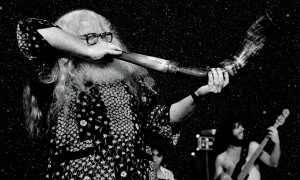Home » Jazz Articles » From the Inside Out » Stax Profiles: Hearts Full Of Soul, Part 2: Otis Redding...
Stax Profiles: Hearts Full Of Soul, Part 2: Otis Redding, The Staples Singers, Johnnie Taylor, Carla Thomas, Rufus Thomas
 Otis Redding
Otis Redding
Stax Profiles
Stax Records
2006
The most beautiful flowers of Otis Redding's music blossomed from his faithful, country gospel roots. When he sang soul music, he was at worship—not at the altar of any deity but in the temple of primal human emotion. Redding sang of love and hurt and longing and redemption with a passionate intensity that continues to transcend space and time.
Perhaps due to his personal familiarity with Redding's material, Steve Cropper, who compiled this disc, selects no fewer than five alternate versions (including "Mr. Pitiful ) and five singles Redding released on Volt Records for this compilation.
Swinging up-tempo, like Sam Cooke's "Shake or the Rolling Stones' "I Can't Get No Satisfaction, Redding sure could rock the house. But when he slowed down, Redding could bring the walls tumblin' down. "My Lover's Prayer, his own composition, captures in three perfect minutes all the uncertainty, the anguished abandonment, of unrequited love. And when he opens "A Change Is Gonna Come (another Cooke composition) with the line "I was born by the river in this little old tent/ And just like this river, I've been running ever since, you find yourself transported to the banks of a river that timelessly flows, part of Redding's search for a love that he has never seen but would never doubt exists.
"I've Got Dreams To Remember, a simply beautiful melody, ends with sweet, sad memories of what might have been.
(Compiled by Steve Cropper, songwriter and guitarist for Booker T & The MGs, who wrote and produced many of Redding's biggest hits. According to Cropper, "I have always said, if you took a half jar of Little Richard and a half jar of Sam Cooke and mixed them together, you would come out with a full jar of Otis Redding. )
 The Staples Singers
The Staples Singers
Stax Profiles
Stax Records
2006
The Staples Singers—patriarch and guitarist Roebuck "Pops Staples and his vocal progeny Mavis, Cleotha, Yvonne and Pervis—was a musical family whose music invited you into the family of all mankind. From Pops' gospel work with the Trumpet Jubilees in the late 1930s through their funky Let's Do It Again soundtrack with Curtis Mayfield in 1975, their recorded history shadows the trajectory of popular music through several decades. The Staples Singers helped keep time for black popular culture from the dawn of the Civil Rights movement to Soul Train.
The Staples recorded several of their biggest hits during their 1968-1975 Stax tenure, supported by Booker T & The MGs, the Memphis Horns, the Memphis Symphony Orchestra and the Muscle Shoals rhythm engine, and this set begins with perhaps their biggest and brightest hit: "I'll Take You There. Simultaneously swinging loose and tight, it glides down the tracks of a string-popping Muscle Shoals bass line, rocked by Mavis' vocal like a real mother.
This Profile also includes the Staples' cross-pollination covers of Sly Stone's celebratory "Everyday People and The Band classic "The Weight, heavy with its own gospel overtones. ("The Weight and "Long Walk To D.C., produced by Cropper in Memphis, were also reissued on the Soul Folk in Action anthology.)
But hit records are not the primary reason why the Staples Singers remain well loved. Their music proved so resonant and enduring because of its message. "Respect Yourself was an important record not only because of its chart success but because of what it said to listeners of every race and creed. Or consider the answers raised by these lyrics to "Are You Sure :
Are you sure there's nothing you can do
To help someone worse off than you
Think about your answer
Are you sure?
The Staples Singers believed that music could change the world. In the post-millennial aftermath of gangsta rap, smooth jazz and death metal, this belief might seem foolish... or wonderful.
(Compiled by musician manager and producer Cheryl Pawelski, whose projects include The Band: A Musical History box set.)
 Johnnie Taylor
Johnnie Taylor
Stax Profiles
Stax Records
2006
In his own way Johnnie Taylor embodied this same American black music journey, and this compilation begins with him singing gospel music with the Soul Stirrers and the Highway Q.C's and ends with him cooing with his throbbing "Disco Lady.
These early gospel tracks include Taylor's feature with the Soul Stirrers, "Out on a Hill (almost unbelievably produced by Sonny Bono). "Rome Wasn't Built in a Day echoes the sound of Taylor's mentor, Sam Cooke, who wrote and produced it for him. (Upon Cooke's own recommendation, Taylor assumed Cooke's place in the Soul Stirrers when Cooke stepped out for his solo career.)
Taylor then moved on to sing about more earthly delights. "I've Been Born Again is not a song about religious conviction but about how the love of a good woman can regenerate a man. But things don't always work out that way, and he moans the lovers' blues in "Part Time Love. Another hit, recorded with Booker T & the MGs plus the Memphis Horns, and most likely Isaac Hayes on piano, contemplates the hurtful implications of the answer to the question, "Who's Making Love ?
JT picks up the 1970s soul/funk gauntlet famously thrown down by James Brown with the heated "Jody's Got Your Girl And Gone, full of rhythm and fury. And although he didn't practice social commentary as often as Brown and others, Taylor's strident voice proved well suited to the uplifting message of "I Am Somebody.
The shimmering "Disco Lady (originally recorded for Columbia and licensed here from Sony) has aged surprisingly well since her 1975 debut. Not a true disco tune—disco would explode about a year later, and this isn't exactly a disco beat—Taylor bumps and grinds her upside Bootsy Collins' monumental bass line, and decks her out in sparkling baubles from Bernie Worrell's keyboard.
(Compiled by Huey Lewis, lead singer for Huey Lewis & The News.)
 Carla Thomas
Carla Thomas
Stax Profiles
Stax Records
2006
Carla Thomas first came to fame as duet partner with her father, blues vaudevillian Rufus Thomas, but these fifteen tracks, spanning 1960-'72, present her as a fledgling solo artist whose career helped clear the trail for other female soul singers and through which she grew from a little girl into a young woman.
Deanie Parker (compiler of the Rance Allen Stax Profile) was one of Thomas' favored songwriters, and this set opens with two Parker tunes. Both are simple paeans to the urgency of blossoming love cast in a romantic slow dance among the shadows of a teen sock hop, "Give Me Enough (To Keep Me Going ) and "I've Got No Time To Lose, co- written with Cropper. Thomas also wrote a lot of her own tunes, such as the orchestral "A Love Of My Own and her doe-eyed breakout hit "Gee Whiz (Look At His Eyes).
Thomas rips up a classic New Orleans rhythm and blues number that's heavy on the blues, "You'll Lose A Good Thing, in the company of Booker T & The MGs and the Mar-Key horns; Cropper's scintillating electric guitar fills prove as enduring and hot as Scotty Moore's work in the totally different context of Elvis Presley's best firebrand rock and roll Sun Records. She also recorded the sweet "(Your Love Is A) Life Safer and "My Man Believes In Me with this collective.
Though Thomas nails down each tune with authority, it's deliciously tempting to imagine the confident womanhood of "I Play For Keeps or her salacious "Sugar sounded out by other famous female soul voices such as Diana Ross or Aretha Franklin.
(Compiled by Mable John, first female artist to record for Motown but who subsequently recorded her biggest hit, "Your Good Thing (Is About to End) for Stax.)
 Rufus Thomas
Rufus Thomas
Stax Profiles
Stax Records
2006
When Stax Records ceased operations in the mid-1970s, Rufus Thomas was the label's longest tenured artist. Thomas began his career in a 1930s' black vaudeville troupe and cut one of Sam Phillips' first sides for Sun Records—"Bear Cat, a "response to Big Mama Thornton's seminal "Hound Dog penned by the very same Leiber-Stoller songwriting team. By the time Thomas recorded for Stax, he knew and pretty much stuck to his formula. He was a blues shouter, rarely a singer; he'd holler out verses, guitars or horns would reply, and they'd toss the rhythm back and forth between them, cooking up eminently funky and hot dance beats.
Many of those dance records are here, including "Do The Double Bump, "Do The Funky Chicken and a mean sprint through "The Breakdown recorded at the Wattstax festival.
Thomas' rolling blues "Strolling Beale No. 1 dates back to the 1930s, though subsequent reflections such as Little Milton's "Walking The Back Streets And Crying have kept its theme up to date. Thomas slow-grinds this blues into powder with Booker T & The MGs plus the Mar-Key horns, and tears through the alternate version of his seminal "Walking The Dog with this same ensemble. Again, Cropper's nasty and raw yet sharply incisive blues guitar tenderizes the meaty groove.
Just don't peg Rufus Thomas as some silly old dancing fool, because he can throw down a heavy ton—like the scandalous "Sixty Minute Man, a lecherous ode to his lovemaking prowess stomped out, sweated out, and pounded out in dark voodoo funk.
(Compiled by Roger Armstrong, expert soul music compiler for Ace Records.)
Related Article
Stax Profiles, Part 1: Rance Allen, Booker T & The MGs, Eddie Floyd, Albert King, Little Milton
Tags
PREVIOUS / NEXT
Support All About Jazz
 All About Jazz has been a pillar of jazz since 1995, championing it as an art form and, more importantly, supporting the musicians who make it. Our enduring commitment has made "AAJ" one of the most culturally important websites of its kind, read by hundreds of thousands of fans, musicians and industry figures every month.
All About Jazz has been a pillar of jazz since 1995, championing it as an art form and, more importantly, supporting the musicians who make it. Our enduring commitment has made "AAJ" one of the most culturally important websites of its kind, read by hundreds of thousands of fans, musicians and industry figures every month.






















